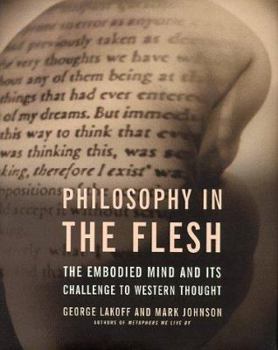Philosophy in the Flesh: The Embodied Mind and Its Challenge to Western Thought
Select Format
Select Condition 
Book Overview
What are human beings like? How is knowledge possible? What is truth? Where do moral values come from? Questions like these have stood at the center of Western philosophy for centuries. In addressing... This description may be from another edition of this product.
Format:Hardcover
Language:English
ISBN:0465056733
ISBN13:9780465056736
Release Date:December 1999
Publisher:Basic Books
Length:640 Pages
Weight:0.60 lbs.
Dimensions:1.9" x 7.8" x 9.6"
Customer Reviews
4 ratings
A good, instructive read!
Published by Thriftbooks.com User , 18 years ago
Unlike some of the other critics here, I thoroughly enjoyed this book and, as for those who feel there is a political axe to grind, I did not read that in this book. Perhaps they are thinking of themselves. Here, Lakoff and Johnson look at the role played by metaphor in constructing meaning. They show (adequately, I thought) that our metaphors rely on the manner in which we are embodied. They do not claim these are rigid categories but, rather, that they are flexible and inter-relate. The body, they argue, gives the structure that provides the metaphors. I also detect a lot of partisan philosophy students at work in these reviews. No mention of Santayana? No mention of Nietzsche? Too tough on Kant? The analysis of Kant is given as a brief example and is not intended to be a thesis. As for the others, I am not convinced that Nietzsche shared the concepts that Lakoff and Johnson outline here. And so far as one critic's remark about it taking a man of genius to create a unified vision...that's just disturbing! I think the book is excellent. The shortcomings pointed to seem to have more to do with critic's expectations than the plan for the book. I would, however, have liked to see more on neuro-physiology and on spatial orientation but (once again) that's got more to do with my needs than the purpose of the book. If you enjoy the book then check out Edward Casey's books on space/place, Yi Fu Tuan's "Space and Place", and Shaun Gallagher's "How the body shapes the Mind".
The best we have so far.
Published by Thriftbooks.com User , 23 years ago
This volume is the best argument we have so far on behalf of the dismantling of Western philosphical traditions based on what has been learned about the human project by cognitive scientists. It is essential reading. The vehemence with which some have dismissed it is certainly a plus, but the book's true value is in every word of the text. We truly can begin again with a more correct understanding of our place in the universe -- the superstitions embedded in Plato's assumptions are seen for what they are: magical thinking.
Shame on them for not citing Piaget
Published by Thriftbooks.com User , 23 years ago
Piaget's concept and work on sensory-motor intelligence and development of ideas, genetic epistemology etc. clearly anticipates them.
Another nail in Plato's coffin
Published by Thriftbooks.com User , 23 years ago
Lakoff and Johnson's book "Philosophy in the Flesh" adds the voice of cognitive linguistics to the growing chorus of voices from science of mind that have informed philosophers: the Platonic World View is nearing the end of its reign over Western philosophy. The human mind is a product of its physical embodiment in the flesh, not some non-physical mystery.In addition to its main story line, "Philosophy in the Flesh" also has a meta-story line. Lakoff and Johnson were well aware of the fact that many philosophers who remain bewitched by the West's Platonic legacy do not want to listen to what the science of mind has discovered. As Lakoff and Johnson clearly explain the situation, Platonic Idealism, Cartesian Dualism, and Anglo-American analytic philosophy are the natural products of a priori philosophical assumptions that are based on certain common sense metaphors such as 'seeing is believing'. Lakoff and Johnson carefully explain how the science of cognitive linguistics has accumulated data that show the limitations of such Folk Psychological views. Within "Philosophy in the Flesh", Lakoff and Johnson included an anticipatory critique of their critics, explaining why these critics remain trapped in a dead-end philosophical world view. The key point is that many philosophers are still trained in the belief that science can have nothing useful to say about the mind. This attitude towards science is a fundamental part of the philosophical tradition that is invalidated by modern science of mind. Thus, we are dealing with the latest installment in the rather intriguing situation of an entire intellectual nation being declared intellectually bankrupt by another intellectual tribe. A perfect setting for a protracted battle! In addition, Lakoff and Johnson explicitly explain what is wrong with postmodernism and why it is at odds with their views. Amazingly, this has not stopped some from calling Lakoff's and Johnson's approach postmodern. There is exceptional irony in this kind of desperate attack on the ideas expressed in "Philosophy in the Flesh".The meta-story line within "Philosophy in the Flesh" serves a useful role for potential buyers of the book. Many critics of "Philosophy in the Flesh" are adherents to the Platonic World View and they have voiced exactly the complaints about "Philosophy in the Flesh" that Lakoff and Johnson explicitly anticipated and accounted for with their meta-story line. What can we conclude when these critics of "Philosophy in the Flesh" fail to mention the meta-story line and how it anticipated their complaints? Most likely, such critics of this book did not read it. If they had, they would have seen the meta-story line and addressed IT in their reviews of the book.If you are a member of the anti-science tribe of philosophers of mind and language, you will have been trained to ignore the arguments and scientific data that are presented by Lakoff and Johnson. If you are already devoted to an investigation of mind and lang




